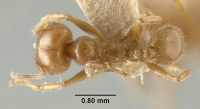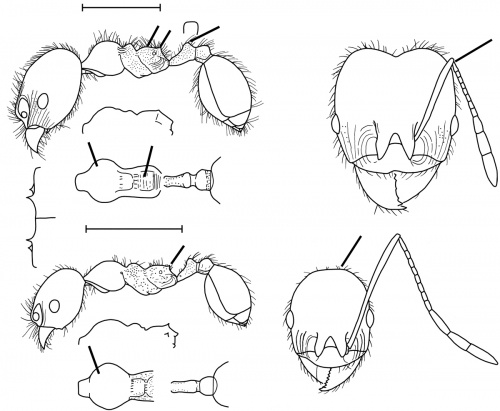Pheidole vafella
| Pheidole vafella | |
|---|---|

| |
| Scientific classification | |
| Kingdom: | Animalia |
| Phylum: | Arthropoda |
| Class: | Insecta |
| Order: | Hymenoptera |
| Family: | Formicidae |
| Subfamily: | Myrmicinae |
| Tribe: | Attini |
| Genus: | Pheidole |
| Species: | P. vafella |
| Binomial name | |
| Pheidole vafella Wheeler, W.M., 1925 | |
Nothing is known about the biology of vafella.
Identification
See the description in the nomenclature section.
Keys including this Species
Distribution
Known only from the two localities in Bolivia listed in the figure caption. (Wilson 2003)
Latitudinal Distribution Pattern
Latitudinal Range: -14.566667° to -14.866667°.
| North Temperate |
North Subtropical |
Tropical | South Subtropical |
South Temperate |
- Source: AntMaps
Distribution based on Regional Taxon Lists
Neotropical Region: Bolivia (type locality).
Distribution based on AntMaps
Distribution based on AntWeb specimens
Check data from AntWeb
Countries Occupied
| Number of countries occupied by this species based on AntWiki Regional Taxon Lists. In general, fewer countries occupied indicates a narrower range, while more countries indicates a more widespread species. |

|
Estimated Abundance
| Relative abundance based on number of AntMaps records per species (this species within the purple bar). Fewer records (to the left) indicates a less abundant/encountered species while more records (to the right) indicates more abundant/encountered species. |

|
Biology
Castes
Nomenclature
The following information is derived from Barry Bolton's Online Catalogue of the Ants of the World.
- vafella. Pheidole vafella Wheeler, W.M. 1925a: 15 (s.w.) BOLIVIA. See also: Wilson, 2003: 243.
Unless otherwise noted the text for the remainder of this section is reported from the publication that includes the original description.
Description
From Wilson (2003): The major and minor are from different localities, as noted in the figure caption. One or more majors from the type locality may be in the Royal Museum of Stockholm and were not seen by me, hence the association of the two castes I have made here is based on Wheeler’s judgment and what does appear to correspond between them in habitus, sculpturing, and pilosity.
P. vafella is somewhat similar to Pheidole crozieri and Pheidole williamsi, differing as follows.
Major: scapes just reach occipital lobes, head heart-shaped in full-face view; propodeal spines reduced to a right angle in side view; propodeal dorsum transversely carinulate; densely covered with short, erect to suberect hairs.
Minor: propodeal spine reduced to denticle; petiolar node low.
MEASUREMENTS (mm) Syntype major (Mojo, Bolivia): HW 1.04, HL 1.08, SL 0.80, EL 0.16, PW 0.56. Syntype minor (Yanalomas, Bolivia): HW 0.56, HL 0.68, SL 0.84, EL 0.14, PW 0.40.
COLOR Major: concolorous dark yellow.
Minor: concolorous brownish yellow.
Figure. Upper: syntype, major (Mojo, Potosi, Bolivia, not the type locality and not certainly associated with the minor; see Description). Lower: syntype, minor (from type locality: Yanalomas, Bolivia). Scale bars = 1 mm.
Type Material
Yanalomas, Bolivia. Naturhistoriska Riksmuseet and Museum of Comparative Zoology - as reported in Wilson (2003)
Etymology
L vafella, little cunning one. (Wilson 2003)
References
- Wheeler, W. M. 1925a. Neotropical ants in the collections of the Royal Museum of Stockholm. Ark. Zool. 17A(8 8: 1-55 (page 15, soldier, worker described)
- Wilson, E. O. 2003. Pheidole in the New World: A dominant, hyperdiverse ant genus. Harvard University Press, Cambridge, MA. (page 243, fig. major, minor described)
References based on Global Ant Biodiversity Informatics
- Fernández, F. and S. Sendoya. 2004. Lista de las hormigas neotropicales. Biota Colombiana Volume 5, Number 1.
- Kempf, W.W. 1972. Catalago abreviado das formigas da regiao Neotropical (Hym. Formicidae) Studia Entomologica 15(1-4).
- Kusnezov N. 1953. La fauna mirmecológica de Bolivia. Folia Universitaria. Cochabamba 6: 211-229.
- Wheeler W. M. 1925. Neotropical ants in the collections of the Royal Museum of Stockholm. Arkiv för Zoologi 17A(8): 1-55.



